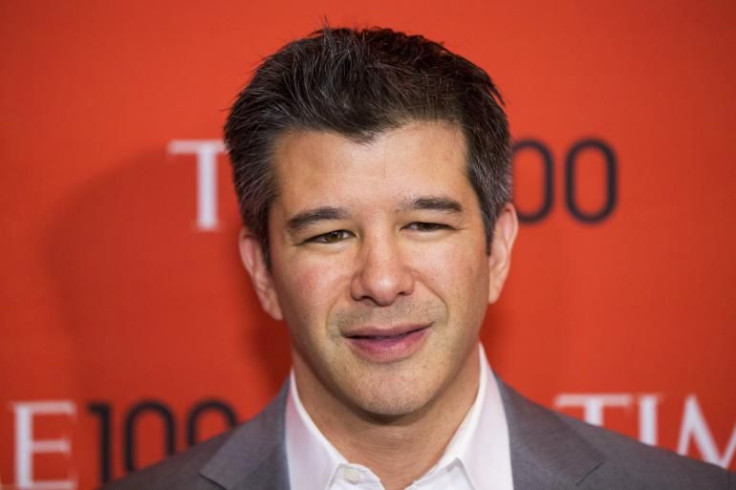Uber CEO's 13-Tweet Apology Misses Opportunity To 'Clean House'

Uber CEO Travis Kalanick tried to cleanse his company of another a PR nightmare with two powerful words: I'm sorry. With 13 tweets, the founder of the rideshare service -- so often the center of controversy -- attempted to diffuse the furor created by Senior Vice President Emil Michael, who suggested Friday Uber could form a task force to harrass and intimidate journalists.
By now Uber should be a veteran at apologies. The company has been plagued by accusations of sexism, strongarming its relationships with its drivers and tampering with the funding of a competitor.
Kalanick's apology distanced the company from Michael, and the CEO says he "will personally commit to our riders, partners and the public that we are up to the challenge" of demonstrating positive steps in telling "the stories of progress Uber has brought to cities and show the our [sic] constituents that we are principled and mean well." The tweetstorm concludes with: "I believe that folks who make mistakes can learn from them -- myself included." It wraps with an apology to Sarah Lacy, a journalist critical of the company.
But Kalanick didn't fire Michael and the smart money says this apology isn't enough to change the narrative. "This was a chance to clean house," said Ed Zitron, Silicon Valley public relations professional and CEO of EZ-PR. "To make a staunch promise that women would be safe, that he would make it his mission. Instead he talked of a vague community, a vague commitment to vague writers, partners and a vaguer public. He did not make any promises here. He simply made a 'personal commitment' to maybe doing something somewhere."
Then there's the depth of the statement, which feels wanting. The apology comes through clearly, "but it also failed to provide any woman riding any Uber, ever, any solid promise that she would be protected. It did not address the statement of Sarah Lacy being 'personally responsible for any woman who followed her lead in deleting [the] Uber [app] who was then sexually assaulted,' to paraphrase the BuzzFeed article," Zitron said.
Then consider the ephemeral nature of the medium used for the apology. "As he tweets more, as time moves on, these tweets will be totally pushed out and removed from Google search. They will not be an actually easily referenced piece," he noted. Tweets are generally only relevant to what's happening in a given moment, quickly losing relevance and being difficult to locate after that.
Uber notably hired former Obama campaign manager David Plouffe in August to help tackle the various regulatory issues Uber faces. But Plouffe is also a seasoned political fixer, and this is a company continually in crisis. We'll see if he can turn around the narrative of what increasingly looks like a tarnished brand.
1/ Emil's comments at the recent dinner party were terrible and do not represent the company.
— travis kalanick (@travisk) November 18, 20142/ His remarks showed a lack of leadership, a lack of humanity, and a departure from our values and ideals
— travis kalanick (@travisk) November 18, 20143/ His duties here at Uber do not involve communications strategy or plans and are not representative in any way of the company approach
— travis kalanick (@travisk) November 18, 20144/ Instead, we should lead by inspiring our riders, our drivers and the public at large.
— travis kalanick (@travisk) November 18, 20145/ We should tell the stories of progress and appeal to people’s hearts and minds
— travis kalanick (@travisk) November 18, 20146/ We must be open and vulnerable enough to show people the positive principles that are the core of Uber’s culture
— travis kalanick (@travisk) November 18, 20147/ We must tell the stories of progress Uber has brought to cities and show the our constituents that we are principled and mean well
— travis kalanick (@travisk) November 18, 20148/ The burden is on us to show that, and until Emil’s comments we felt we were making positive steps along those lines
— travis kalanick (@travisk) November 18, 20149/ But I will personally commit to our riders, partners and the public that we are up to the challenge
— travis kalanick (@travisk) November 18, 201410/ We are up to the challenge to show that Uber is and will continue to be a positive member of the community
— travis kalanick (@travisk) November 18, 201411/ And furthermore, I will do everything in my power towards the goal of earning that trust.
— travis kalanick (@travisk) November 18, 201412/ I believe that folks who make mistakes can learn from them – myself included.
— travis kalanick (@travisk) November 18, 201413/ and that also goes for Emil ..
— travis kalanick (@travisk) November 18, 201413/ and last, I want to apologize to @sarahcuda
— travis kalanick (@travisk) November 18, 2014© Copyright IBTimes 2024. All rights reserved.






















